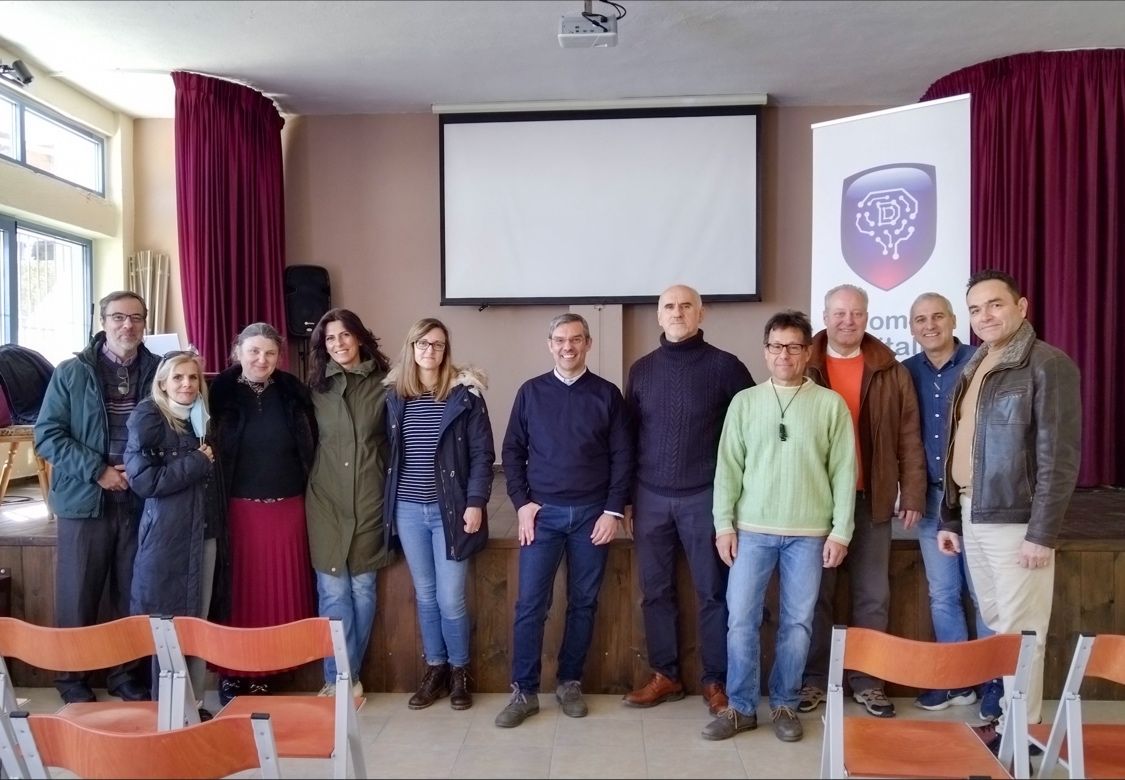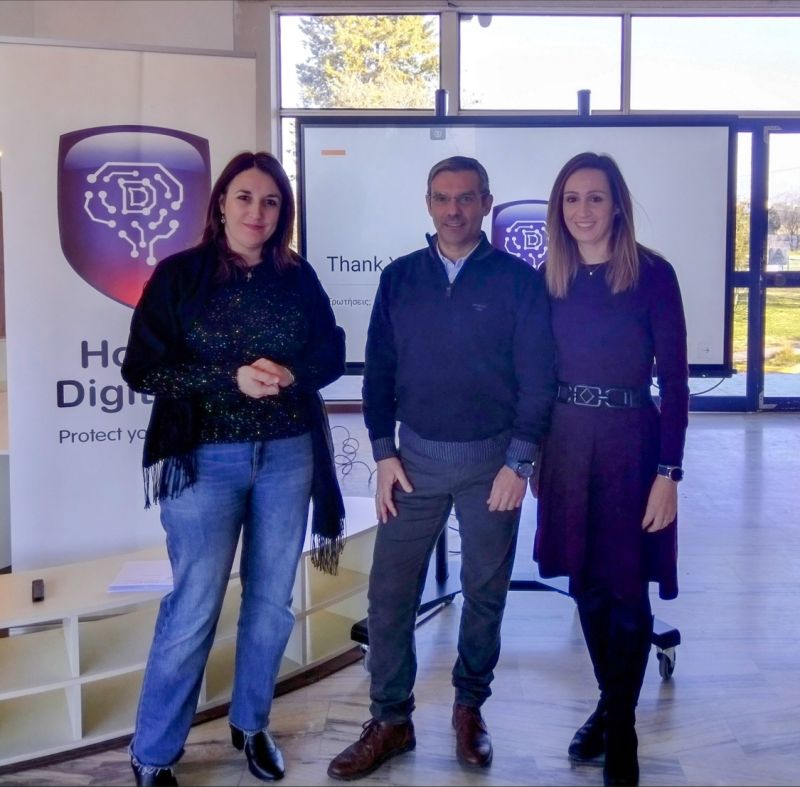We participated in an event organised by the European AI & Society Fund and Civitates in Brussels
Homo Digitalis was delighted to participate in a joint event organised by the European AI & Society Fund and Civitates last week in Brussels.
Funders and grantee organisations had the opportunity to discuss in person the developments of the civil society ecosystem working on technology and society. We talked about current and upcoming policy changes and how we can better mobilise our network to address the challenges and shape a better future!
We were represented at the event by our Director for Human Rights & AI, Lamprini Gyftokosta!
Homo Digitalis speaks about the Safer Internet Day 2024 at Pyrgettos Gymnasium and Lyceum
Part A’
Today is Safer Internet Day and Homo Digitalis was once again in many different schools in Greece, completely voluntarily, to talk to students and teachers about our digital rights with the presentations “digital footprint” and “cyberbullying”.
Homo Digitalis and our member Anastasios Arabatzis visited Pyrgettos High School and Lyceum and we were surprised by the active participation and interest of the public in our activities.
Homo Digitalis talks about Safer Internet Day 2024 at the Hellenic American Educational Foundation Athens College - Psychico College Primary School.
Part B’
Today is Safer Internet Day and Homo Digitalis was once again in many different schools in Greece, completely voluntarily, to talk to students and teachers about our digital rights with the presentations “digital footprint” and “cyberbullying”.
Homo Digitalis and our members Kostas Kakavoulis, Lamprini Gyftokosta, Nikoleta Georgakopoulou and Ariana Rapti visited the elementary school of the Hellenic American Educational Foundation Athens College – Psychico College.
Our participation in the Privacy Camp in Brussels for another year
Last week we attended the Privacy Camp in Brussels, one of the most important annual meetings in the field of digital rights internationally, organized by European Digital Rights in collaboration with the Research Group on Law, Science, Technology & Society (LSTS) at the Vrije Universiteit Brussel (VUB), Privacy Salon, Institute for European Studies, ULB (IEE-ULB), Institute for Information Law (IViR) at UvA and the Racism and Technology Center!
There we had the pleasure to meet with EDRi network organisations and other civil society representatives, European institutions, academic institutions and other partners!
Homo Digitalis was represented at the meeting by our President, Elpida Vamvaka, and there we met with many of our members who participated in the meeting, including Alexandra Giannopoulou and Emilia Givropoulou.
Homo Digitalis' speech on Artificial Intelligence at an event organized by the Youth Council of the Stavros Niarchos Cultural Center
This Sunday 4/2 at 17:00-19:00 (free entrance without registration) the Youth Council of the Stavros Niarchos Foundation Cultural Center (SNFCC) is organizing and curating a series of 4 short talks on AI at the Book Tower of the National Library of Greece!
Homo Digitalis was invited to speak on issues of intellectual property and legal personality of AI based on the latest developments where newspapers, artists and authors are suing companies like Open AI.
We will be represented at the event by AI & Human Rights Director Lamprini Gyftokosta.
The aim of the event is to have an open discussion with the audience and not just a monologue by the speakers! We look forward to seeing you in person and discussing these and many other topics with them:
-Panagiotis Koromilas, PhD candidate at the National Centre for Physical Sciences Research “Demokritos” NCSR “DEMOKRITOS”
-Orfeas Menis Mastromichalakis, PhD candidate and researcher at the Laboratory of Artificial Intelligence and Learning Systems of the National Technical University of Athens and
-Maria Mavropoulou , visual artist
We are organising a workshop for an innovative digital identity wallet in the framework of the PRIVÉ project
Homo Digitalis is a proud partner of the PRIVÉ project!
On 13 February at 18.00, we will host a workshop to present the solution developed within the project and have it evaluated by privacy-conscious end-users:
The EUDI wallet will revolutionise the way digital identity is handled in Europe. But how do we achieve widespread user adoption? Are privacy and trust important factors and are they sufficiently taken into account in the current EUDI architecture?
In response to these pressing questions, the PRIVÉ project is pleased to announce a webinar (hybrid) on 13 February 2024. This event will present an innovative solution for digital identity wallets that not only emphasizes strong privacy mechanisms, but also features seamless integration with the eIDAS and GDPR frameworks, setting a new benchmark for digital identity solutions.
13.02.2024, 18:00 Athens time
Three parallel sessions simultaneously:
-Athens.
-HERAKLEIO: at Bizrupt, Vikelas 34-36.
-Online session via Zoom
This webinar offers a unique, hands-on experience with PRIVÉ Wallet, inviting participants to engage directly with the technology through a real-life implementation scenario. We invite you to be part of its evolution. Your feedback on the usability of the wallet and your insights into the factors influencing the adoption of EUDI wallets by European citizens will be invaluable.
Join us in shaping the future of digital identity in Europe – a future where your identity is secure, your privacy is respected and your trust is earned.
You can learn more and register here.
Pro bono Educational Presentation at the Karavanas School in Larissa
Homo Digitalis continues its informative talks in schools pro bono!
Yesterday Anastasios Arampatzis spoke at the Karavanas School in Larissa on the topic of Digital Footprint. The speech was attended by 60 high school students.
We would like to thank the Director of the High School, Mrs. Lena Papakostouli, as well as Mrs. Zoe Goundela, the school’s IT teacher, who presented with us.
It was an excellent experience, with the active participation of the students, who deserve a big thumbs up!
Privacy Day is not a day of wishes, but a day of responsibility!
28 January is the international day dedicated to the protection of personal data!
Since March 2018, and for almost 6 years now, Homo Digitalis has carried out important actions for the protection of personal data in all 3 pillars of its action, those of awareness-raising, policy-making and legal actions.
At our celebratory event last month, we spent about 2 hours talking about all our successes. For today, we prepared a short video of a few seconds to present some highlights of these successes. Because today is not a day of wishes, but a day of responsibility! You can watch our short video https://www.linkedin.com/feed/update/urn:li:activity:7157389006190608384here.
Participation of Homo Digitalis in the 3rd LAW FORUM ON DATA PROTECTION
We are pleased to announce that two representatives of Homo Digitalis will speak at the 3rd LAW FORUM ON DATA PROTECTION, organized by CLEON Conferences & Communications on Thursday 8/2/2024 in Athens!
Our Director of Human Rights & Artificial Intelligence, Lambrini Gyftokosta, and our Vice President of the Board of Directors, Stefanos Vitoratos, will participate in the panel discussions and talk to the other speakers and the audience!
We are honored that for the third consecutive year, the conference is held under the auspices of Homo Digitalis and other major players in the field, such as the Hellenic Association of Data Protection and Privacy , ISC2 Hellenic Chapter, PA.SY.S.DI.K. HARIMA, Association of Compliance Officers in Greece – ASCO Greece and DPO Network.
More information can be found on the organizer’s website here.








